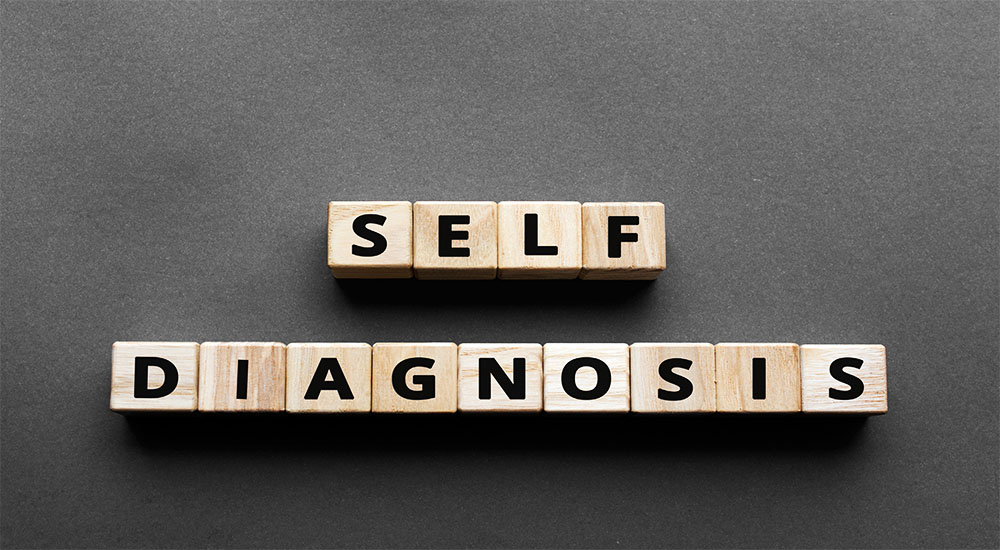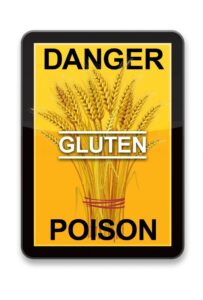Is there a Problem with Diagnosing Yourself with Gluten Sensitivity?

It’s Not Easy to Receive a Correct Diagnosis

Last week Nutrition in Clinical Practice published an article entitled, “Characterization of Adults with a Self-Diagnosis of Non-celiac Gluten Sensitivity”. While I’m excited about any studies that focus on gluten sensitivity, there were some points I wanted to take up regarding the conclusions reached by the authors.
New Study Evaluates Those with Self-Diagnosed Gluten Sensitivity
Of those 248 individuals willing to participate in the study, a full 72% were excluded because they either had never adequately ruled out celiac disease as a potential diagnosis (62%), they had uncontrolled symptoms despite their gluten restriction (24%), or they were not following a strict gluten-free diet (27%). Certainly, one of our bigger challenges is effectively and accurately diagnosing celiac disease and gluten sensitivity. It’s a bit of a conundrum when we appreciate that there is no perfect test for either. We have decent blood tests and criteria for the diagnosis of celiac disease, it’s true.
Even though with those criteria we miss diagnosing about 95% of those who suffer due to ill-informed doctors who don’t know the 4 of 5 criteria that must be met or ill-informed doctors who don’t perform the lab test to those who are suffering. In any case, the final analysis is that grade of “F” we mentioned earlier, because at best we diagnose maybe 7% of those who suffer – very poor indeed.
Ruling Out Celiac Disease is Always a Good Idea… If Possible
Is it important to test for celiac disease before embarking on a gluten-free diet? Absolutely, in a perfect world where testing is abundant and easily accessible and doctors are amenable, it’s the best course of action. But what about when it’s not affordable or the doctor refuses to order the test? What are those patients supposed to do? Should patients who cannot be tested continue to eat gluten and destroy their health and lessen their lifespan?
Of course not. It’s a much better strategy to figure out for yourself that gluten isn’t your friend, eliminate it, and improve your health. And, while it can be said that the best way to fully and accurately diagnose celiac disease is to be eating gluten at the time of testing, there are some alternatives if one has already gone gluten-free.
One alternative is genetic testing. If an individual is maintaining a gluten-free diet and sees a dramatic change in their health, they are left with the question of whether they have celiac disease or gluten sensitivity. An easy way to rule one out is to have a genetic test, when feasible. If you suspect celiac disease and don’t carry the genes for it, you can safely assume you don’t have it and never will. Therefore by a process of elimination, you can deduce the problem to be gluten sensitivity in light of no celiac genes.
Why is Gluten Free Sometimes Not Enough?
What about the point made that individuals were being excluded from the diagnosis of gluten sensitivity when they continued to have symptoms despite their gluten restriction? That could be accurate, but it could also be due to other issues.
Certainly, it’s more common for patients to eliminate gluten and see dramatic positive changes in their symptoms. However, as a clinical nutritionist, I’ve seen patients at our Root Cause Medical Clinic with celiac disease, who eliminated gluten and felt no change in how they felt. Does that mean they don’t have celiac disease? Or does it mean they shouldn’t follow a gluten-free diet? Of course not; it just means that an additional stressor underlying the troublesome symptoms has been missed.
Look to the Secondary Effects of Gluten
This is why we created the concept, “Secondary Effects of Gluten”. Whether secondary to gluten sensitivity or celiac disease, the body that reacts to gluten is susceptible and vulnerable to other negative conditions occurring. These “secondary effects” consist of such things as infections, cross-reactive food reactions, poor nutrient status, inadequate enzyme, and probiotic levels, hormonal imbalance, and a hypervigilant immune system that can create autoimmune-type reactions.
Each individual has their own set of secondary effects, but if they’re not properly addressed the person will continue to have symptoms. The most common manifestation of this is someone who eliminates gluten and initially feels a lot better but within several months or even as long as a year or two, the symptoms return despite maintaining their gluten-free diet. The reason why symptoms return lies squarely on the shoulders of untreated secondary effects. It’s a grossly misunderstood area and we are one of the few clinics I know of that have not just coined a term for it but have a protocol that works!
Cheating is Always a Bad Idea
Getting back to the study, a full 27% of the participants who volunteered were not following a gluten-free diet. We too find this commonly amongst those who know better. For some reason, it is human nature to want to cheat. We like to push the envelope to see how far we can go and not feel too badly. This mentality is a dangerous one and I find it based on a poor education of the condition. If no one ever told you that gluten creates much of its damage silently, you’d never know it. Once you do, you see the liability of cheating, even when you don’t “feel” it.
I understand the concept: “If I have a bite of this or that and I don’t seem to feel bad, then it’s okay, right?” Wrong! It’s far from okay. If you have celiac disease or gluten sensitivity you are playing Russian roulette with your health and your very life – and that’s no understatement.
The researchers further discovered that of those participants who had received an intestinal biopsy, almost a third of them had been ingesting no or very little gluten at the time of the test. This could result in a false negative and rule out celiac disease in someone who was actually suffering from it.
Here at Root Cause Medical Clinic, we too run into this situation often. A patient has either received a positive blood test for celiac and subsequently ceased eating gluten, or, as in the cases we are discussing here, they have self-prescribed a gluten-free diet after noticing a big improvement in their health when eating gluten-free.
Is a Biopsy Mandatory for a Diagnosis of Celiac Disease?
In the case of the positive blood test, if they fulfill other criteria needed to diagnose celiac disease, they are definitely not required to also have a positive biopsy – unfortunately, many doctors are still not aware of that fact. In the case of the patient embarking on the diet themselves, we have a hard and fast rule here at the clinic when it comes to reintroducing gluten in order to perform a lab test – DON’T!! Why?
If one is truly gluten sensitive, reintroducing it can create effects that can be quite serious, including autoimmune disease and cancer. It’s just not worth it to reintroduce gluten, ever. Now if you are pretty convinced that gluten doesn’t bother you, that’s another story. Reintroduce at your own risk and definitely, after reintroduction, try to get a comprehensive blood panel that looks for celiac and gluten-sensitive findings. It’s best to know for sure before you make gluten a regular part of your diet.
Finally, the authors concluded the following:
- 25% of those participating fulfilled the criteria for gluten sensitivity. [So self-diagnosis isn’t all bad.]
- The initiation of a gluten-free diet without adequately excluding celiac disease first is common.
- 25% of participants had poorly controlled symptoms, despite avoiding gluten. [Note: that’s where the secondary effects of gluten may be playing a role.]
Was this a great study? No, not particularly in my opinion. But it did point out some good things and the fact that researchers are spending time in the arena of learning more about gluten sensitivity is definitely a step in the right direction.
Here’s Our Takeaway Advice
- Try to get tested before going gluten-free.
- If you can’t get tested, definitely try a 30 day trial of gluten avoidance and see how you feel.
- If you do see benefits from going gluten-free, NEVER reintroduce it to perform a lab test – it’s dangerous.
- Remember that you can always perform a gene test, even if you’re not eating gluten.
- Find a clinician aware and savvy of the secondary effects of gluten so that you can ensure a full recovery. If you need help with this one, let me know.
Do you need help with your health?
We have the diagnostic and testing tools, the clinical experience, and a different medical approach to discovering the root cause of why you have the symptoms that are bothering you. As long as you are ready to make some dietary and lifestyle changes, we can help you. We will "hold your hand" through the changes, step by step, to make each step an easy one. We are located in Clearwater, FL, at 1000 S Ft Harrison, at the corner of Ft. Harrison Ave. and Magnolia St. There is plenty of parking space directly accessible from Ft Harrison. If it is not convenient for you to come to Root Cause Medical Clinic, we offer telehealth/telemedicine consultations to residents of certain states. Call us for details.
Contact us for a Consultation – Call 727-335-0400

Dr. Vikki Petersen DC. CCN
Founder of Root Cause Medical Clinic
Certified Functional Medicine Practitioner
Dr Vikki Petersen is a public speaker, author of two books, several eBooks and creates cutting edge content for her YouTube community. Dr Vikki is committed to bringing Root Cause Medicine and its unique approach to restoring health naturally to the world.
Ask a Doctor
Have a health concern you'd like to speak with a doctor about? Or just want clarity on a subject? Ask Us!


